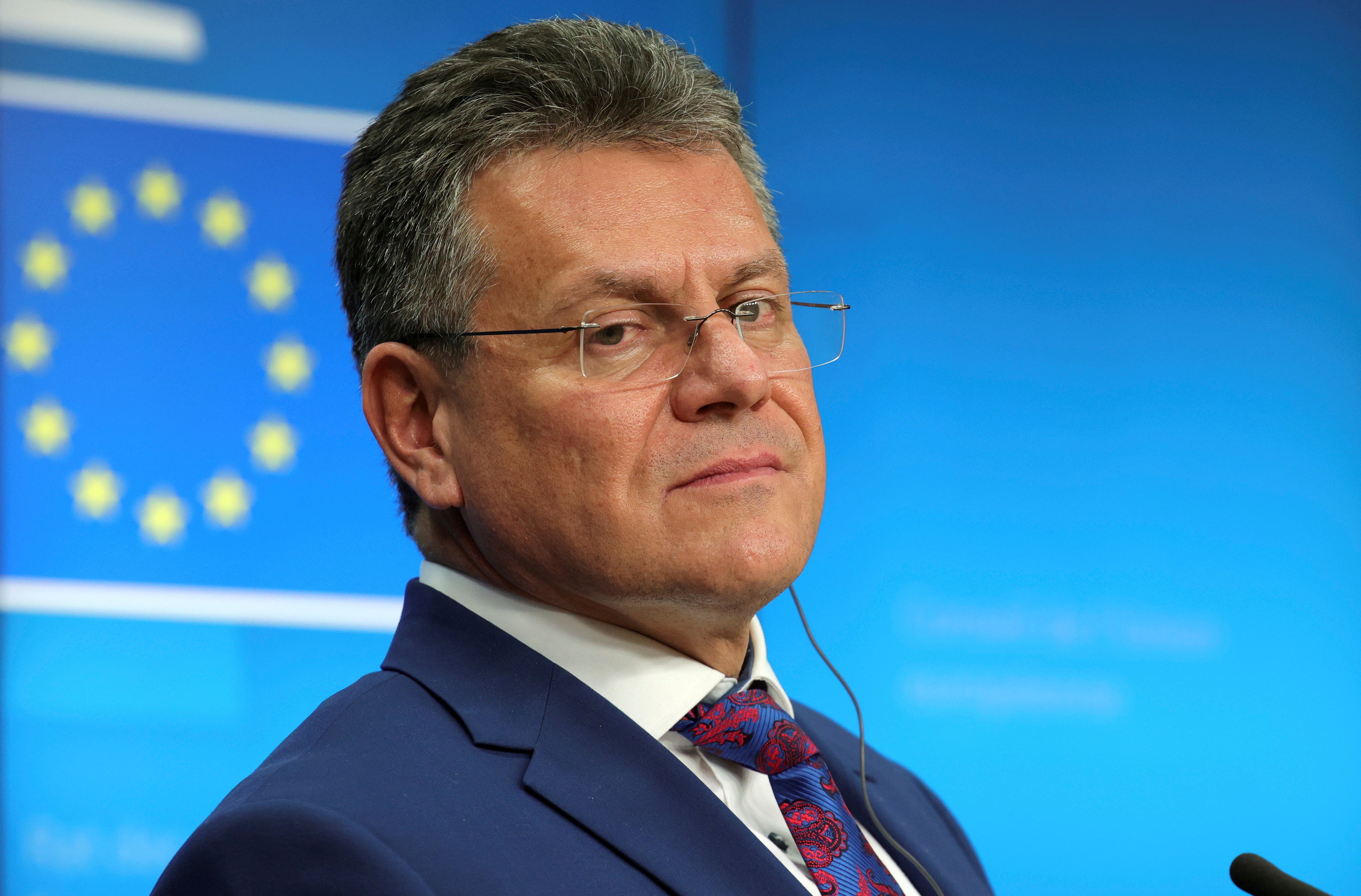Brexit: EU to unveil proposals aimed at resolving political stand-off over Northern Ireland agreement
Bloc expected to offer fewer border checks on goods entering Northern Ireland from Great Britain

Your support helps us to tell the story
From reproductive rights to climate change to Big Tech, The Independent is on the ground when the story is developing. Whether it's investigating the financials of Elon Musk's pro-Trump PAC or producing our latest documentary, 'The A Word', which shines a light on the American women fighting for reproductive rights, we know how important it is to parse out the facts from the messaging.
At such a critical moment in US history, we need reporters on the ground. Your donation allows us to keep sending journalists to speak to both sides of the story.
The Independent is trusted by Americans across the entire political spectrum. And unlike many other quality news outlets, we choose not to lock Americans out of our reporting and analysis with paywalls. We believe quality journalism should be available to everyone, paid for by those who can afford it.
Your support makes all the difference.The European Union will today outline proposals aimed at resolving the political stand-off over the Brexit agreement, with an offer to significantly reduce border checks on British goods entering Northern Ireland.
It comes after Brexit minister Lord Frost dialled up the government’s hardline rhetoric over the contentious issue in a speech on Tuesday, warning the bloc it would be a “historic misjudgement” not to rewrite the deal.
But the minister was accused of stoking tensions by accusing the EU of being “disrespectful” and attempting to reverse the referendum result, as he effectively demanded the cancellation of the Northern Ireland Protocol which he negotiated and Boris Johnson signed in 2019.
Reports from Brussels indicate that the bloc will offer the waiver of up to 50 per cent of post-Brexit border checks on goods entering Northern Ireland from mainland Britain, with more than half on chilled meats and plants.
European Commission vice president Maros Sefcovic, who will front a press conference on Wednesday afternoon, has previously said the measures will be “very far-reaching” and address issues over the movement of agri-food goods and medicines across the Irish Sea.
Brussels has stressed that the proposals being put forward today are the result of consultations with businesses on both sides of the Irish border and are not a response to Lord Frost’s speech.
It is understood that in return for allowing more goods to pass into Northern Ireland without checks, Mr Sefcovic will demand more data from the UK to allow surveillance of products which may pass through the province into the EU single market.
“We have gone to the outer limits of what member states, particularly France, will wear,” one Brussels source told The Independent. “These proposals are a sensible basis for further discussion, not a take-it-or-leave offer.”
While holding open the option of negotiation with the UK, Mr Sefcovic - under pressure from Paris and other capitals - is also preparing contingency plans in the event Boris Johnson suspends the provisions of the protocol by invoking Article 16 of the deal.
Many in Brussels expect the PM to do so and fear that, once this line has been crossed, it will be difficult for him to row back to an agreement on the protocol.
Under Article 16, the EU could retaliate with the imposition of tariffs on UK exports, potentially leading to a trade war in a worse-case scenario.
The European Commission would request permission from the European Court of Justice to take “interim measures” in response to UK non-implementation of the protocol, and these measures would not have to be restricted to the Irish border issues at the heart of the row.
The process would take many months and possibly more than a year, but it could involve onerous tariffs on a range of UK products, making them more expensive for European consumers.
One EU source said: “We do not want a continuing dispute with the UK. But if the UK plays hardball, we will be ready.” While the measures being unveiled by Mr Sefcovic today may reduce everyday friction between NI and GB, a major point of contention remains over the role of the ECJ after Lord Frost suggested the court’s oversight was a red line for the government.
Under the terms of the deal struck by Boris Johnson in 2019 and later hailed by ministers, the ECJ would be the final arbitrator in any future trade dispute between the two parties on the operation of the protocol.
The UK government now wants to remove that position and replace it with an independent arbitration process, but Mr Sefcovic has insisted that the EU will not move on the issue.
Brussels suspects that the ECJ is being used as a distraction to provide cover for the UK to suspend the protocol by triggering Article 16 after a few weeks’ negotiations.
Asked whether the proposals reported would be enough, Oliver Dowden, the Conservative Party chairman, told Sky News: “We’ll wait until we receive the full announcement from the EU.
“The government as a whole will engage fully, constructively, with these proposals. It is important there is fundamental change to the Northern Ireland Protocol — let’s see exactly what the EU comes up with.”
He added that there were “wider questions about the competence” about the European Court of Justice, adding: “This treaty rather uniquely is governed by the courts of one party to it.”
However, he declined to say whether altering this section of the deal would be a “deal breaker”, adding: “It is a major issue for us — I’m not going to start pre-empting, writing red lines here and there.”
Join our commenting forum
Join thought-provoking conversations, follow other Independent readers and see their replies
Comments